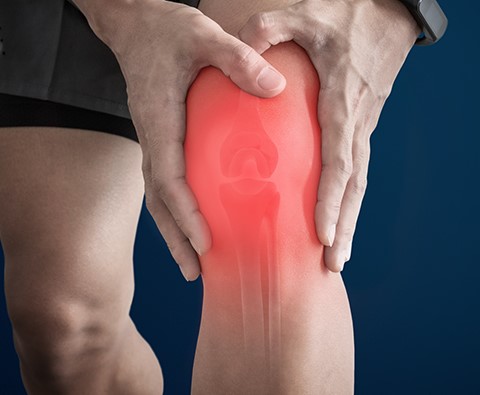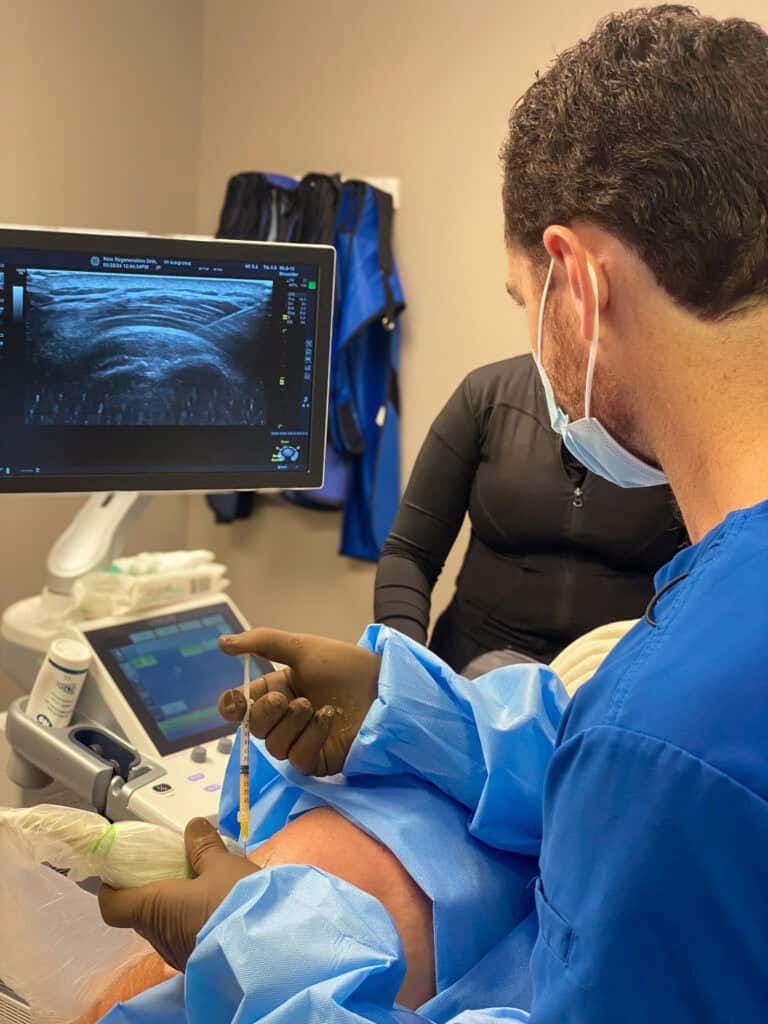mFat/Lipogem injections
m/Fat therapy, also known as lipogem injections, is a cutting-edge treatment in regenerative medicine. The treatment involves using a patient’s own fat cells to treat pain and inflammation.

At a glance
About
Mildly-invasive treatment for joint, ligament and muscle injuries
Effective
Referrals
Not Needed
Booking
Instant-book option available
Cost
-
London £ 4995
-
Lincolnshire £ 4995
-
Lincolnshire £ 4995
Nature of mFat/Lipogem injections
mFat/Lipogem injections are regenerative treatments that use the patient’s own fat cells to stimulate healing in damaged knee tissues. The procedure involves extracting fat tissue from the patient’s body, processing it to concentrate the stem cells, and then injecting it into the affected area of the knee. This treatment promotes tissue repair, reduces inflammation, and enhances joint function by utilising the body’s natural regenerative capabilities. mFat/Lipogem injections offer a minimally invasive, non-surgical option for patients seeking relief from knee pain and degeneration.
Common causes of joint problems treated by mFat/Lipogem injections
Knee joint problems treated with mFat/Lipogem injections are often caused by:
Osteoarthritis: The wear and tear of cartilage causes joint pain, stiffness, and swelling.
Ligament or tendon injuries: Damage to ligaments or tendons can cause instability and discomfort in the knee joint.
Previous knee trauma: Injuries like fractures or sprains may impair healing, resulting in long-term knee pain.
Age-related degeneration: As we age, the body’s ability to repair damaged tissues decreases, leading to increased joint discomfort.
Chronic inflammation: Ongoing inflammation in the knee can lead to persistent pain and reduced mobility.
Diagnosis for mFat/Lipogem injections
Diagnosis for mFat/Lipogem injections begins with a clinical assessment to evaluate symptoms like knee pain, swelling, and limited range of motion. Imaging tools such as X-rays or MRIs may be used to assess cartilage damage, ligament tears, or other joint issues.
If non-surgical treatments have failed and knee degeneration or damage is identified, mFat/Lipogem injections may be recommended to promote healing and restore joint function. These injections are particularly beneficial for patients with conditions like osteoarthritis or tendon injuries.
Suitable for
Osteoarthritis

Cartilage and ligament injuries

Chronic tendon injuries

Treatment overview
mFat uses mesenchymal stem cells taken from fat tissue. These cells play an important role in healing and regeneration.
The mFat process involves harvesting fat tissue using liposuction, under anaesthetic. This tissue is then processed using the Lipogems system, which enriches it with MSCs. The prepared solution is then injected into the injured area, to promote healing.
Extensive research and clinical trials worldwide back the safety and efficacy of mFat treatment in improving joint function and relieving pain.

Benefits

One of the most versatile regenerative injection treatments

Can be combined with treatments like hyaluronic or PRP injections, for improved results

Pain relief can be noticed in as little as 2-4 weeks

A possible alternative to surgery
How to Pay
We offer a range of flexible payment options to make your treatment experience smooth and stress-free.
Paying for Yourself (Preferred Option)
Most patients choose to self-fund their treatment. We accept:
- Bank Transfers
- Credit/Debit Cards
- Cash (in person only)
Instalment Plans
We’ve partnered with GoCardless to offer interest-free instalment options. You can easily set up a Direct Debit to spread the cost of your treatment over time.
Finance Options
Looking for a financing plan? You can apply through Kandoo, our trusted finance partner.
- Instant online decision
- No impact on your credit score
- Multiple lenders for competitive rates
Private Medical Insurance (Limited Availability)
We work with a small number of approved insurance providers. However, due to restrictions from many insurers, not all treatments are covered. Please check with your insurer and speak to our team before booking to avoid disappointment.
The booking process
Online booking/call
Use our Calendly to book an initial consultation, or give us a call.
01
Consultation
If you are a new patient, our doctors might arrange a consultation before treatment.
02
Treatment
You will be booked in for treatment.
03
Follow up
Our doctors might arrange a follow-up consultation, to check your response to treatment.
04
Discharge
Once your doctor is happy with your recovery, you will be discharged. After discharge, we are always here for further questions or support, should you need it.
05
Frequently Asked Questions
What is the recovery time?
Most patients can resume normal, day-to-day activities within a few days. Strenuous exercise should be avoided for a couple of weeks.
How many treatments do I need?
Most patients respond well to a single mFat injection. However, follow-up treatments may be advised, depending on the severity of your condition. Your MSK Doctor may also advise complementary treatments.
Injection Treatment Comparison
Explore the key differences between leading injection therapies used in joint, tendon, and cartilage care. Compare their effectiveness, uses, recovery time, and potential drawbacks to help guide your treatment decisions.
Injection Type | Best For | Effectiveness (⭐ out of 5) | What It Does | Recovery Time | Downside |
|---|
Hyaluronic Acid (HA) Injection
Injection Type | Best For | Effectiveness (⭐ out of 5) | What It Does | Recovery Time | Downside |
|---|---|---|---|---|---|
Hyaluronic Acid (HA) Injection | Mild to moderate knee osteoarthritis, joint lubrication | ⭐⭐⭐ | Lubricates joints, reduces friction, and relieves pain in osteoarthritis. | Immediate return to daily activities, effects last 3-12 months.
| Short-term relief, effects wear off over time; does not regenerate cartilage.
|
Cartilage Matrix Injection
Injection Type | Best For | Effectiveness (⭐ out of 5) | What It Does | Recovery Time | Downside |
|---|---|---|---|---|---|
Cartilage Matrix Injection | Moderate to severe cartilage damage, osteoarthritis, surgical augmentation | ⭐⭐⭐⭐⭐ | Provides a structural scaffold to support cartilage repair and regeneration. | Minimal downtime, improvement in 4-6 weeks, lasting 6-12 months. | May lead to mild inflammation or combination with other therapies for best results |
Arthrosamid Injection (Hydrogel)
Injection Type | Best For | Effectiveness (⭐ out of 5) | What It Does | Recovery Time | Downside |
|---|---|---|---|---|---|
PRP (Platelet-Rich Plasma) Injection | Tendon injuries, mild arthritis, post-surgical healing. | ⭐⭐⭐ | Uses growthregfactors from the patient’s own blood to stimulate healing and reduce inflammation. Work well on ligaments and tendons. | Minimal downtime, improvement seen in 4-6 weeks, lasting 6-12 months. | Not very effective for established Arthritis. Unless combined with other treatments. |
PRP (Platelet-Rich Plasma) Injection
Injection Type | Best For | Effectiveness (⭐ out of 5) | What It Does | Recovery Time | Downside |
|---|---|---|---|---|---|
PRP (Platelet-Rich Plasma) Injection | Tendon injuries, mild arthritis, post-surgical healing. | ⭐⭐⭐ | Uses growthregfactors from the patient’s own blood to stimulate healing and reduce inflammation. Work well on ligaments and tendons. | Minimal downtime, improvement seen in 4-6 weeks, lasting 6-12 months. | Not very effective for established Arthritis. Unless combined with other treatments. |
mFAT (Microfragmented Adipose Tissue) Injection
Injection Type | Best For | Effectiveness (⭐ out of 5) | What It Does | Recovery Time | Downside |
|---|---|---|---|---|---|
mFAT (Microfragmented Adipose Tissue) Injection | Moderate to severe arthritis, joint degeneration, soft tissue repair | ⭐⭐⭐⭐ | Fat-derived stem cells injected into joints to reduce inflammation and promote tissue repair. | Light activity immediately, pain relief in 2-4 weeks, lasting 6-24 months | Requires minor liposuction to harvest fat; may not be as effective in severe arthritis |
BMAC (Bone Marrow Aspirate Concentrate) Injection
Injection Type | Best For | Effectiveness (⭐ out of 5) | What It Does | Recovery Time | Downside |
|---|---|---|---|---|---|
BMAC (Bone Marrow Aspirate Concentrate) Injection | Fracture healing. Previously used for cartilage regeneration; less preferred due to inconsistent results | ⭐⭐ | Bone marrow cells injected for potential cartilage repair, but effectiveness varies. | Minimal restrictions, noticeable effects in 3 months, full benefits in 6-12 months. | Inconsistent results, Very invasive; less preferred compared to other regenerative options. |
Cortisone (Steroid) Injection
Injection Type | Best For | Effectiveness (⭐ out of 5) | What It Does | Recovery Time | Downside |
|---|---|---|---|---|---|
Cortisone (Steroid) Injection | Severe inflammation, advanced arthritis pain management (short-term use only) | ⭐
(Anti-Inflammatory) | Powerful anti-inflammatory, provides temporary pain relief but accelerates joint degeneration. | Immediate pain relief, but potential long-term cartilage damage. Best when mixed with PRP & HA to reduce toxicity. | Toxic to cartilage; long-term use can accelerate joint degeneration. |
Exosome Injection
Injection Type | Best For | Effectiveness (⭐ out of 5) | What It Does | Recovery Time | Downside |
|---|---|---|---|---|---|
Exosome Injection | Early-stage arthritis, tendon injuries, inflammation modulation, post-surgical recovery. | ⭐⭐⭐ | Delivers signaling molecules that promote regeneration, reduce inflammation, and support healing at a cellular level. | Minimal downtime, improvement seen in 3-6 weeks, lasting 6-12 months. | Still experimental; effectiveness varies depending on the condition treated. |
Injection Type | Best For | Effectiveness (⭐ out of 5) | What It Does | Recovery Time | Downside |
|---|---|---|---|---|---|
Hyaluronic Acid (HA) Injection | Mild to moderate knee osteoarthritis, joint lubrication | ⭐⭐⭐ | Lubricates joints, reduces friction, and relieves pain in osteoarthritis. | Immediate return to daily activities, effects last 3-12 months.
| Short-term relief, effects wear off over time; does not regenerate cartilage.
|
Cartilage Matrix Injection | Moderate to severe cartilage damage, osteoarthritis, surgical augmentation | ⭐⭐⭐⭐⭐ | Provides a structural scaffold to support cartilage repair and regeneration. | Minimal downtime, improvement in 4-6 weeks, lasting 6-12 months. | May lead to mild inflammation or combination with other therapies for best results |
Arthrosamid Injection (Hydrogel) | Moderate to severe knee osteoarthritis, locking in regeneration effects, shielding the synovium | ⭐⭐⭐⭐
(Anti-degeneration) | Does not regenerate cartilage but indirectly reduces inflammation and protects the joint. | Immediate return to activities, full effect in 2-4 weeks, lasts 12-24 months | Does not regenerate cartilage, only helps maintain improvements and Side effect profile. |
PRP (Platelet-Rich Plasma) Injection | Tendon injuries, mild arthritis, post-surgical healing. | ⭐⭐⭐ | Uses growthregfactors from the patient’s own blood to stimulate healing and reduce inflammation. Work well on ligaments and tendons. | Minimal downtime, improvement seen in 4-6 weeks, lasting 6-12 months. | Not very effective for established Arthritis. Unless combined with other treatments. |
mFAT (Microfragmented Adipose Tissue) Injection | Moderate to severe arthritis, joint degeneration, soft tissue repair | ⭐⭐⭐⭐ | Fat-derived stem cells injected into joints to reduce inflammation and promote tissue repair. | Light activity immediately, pain relief in 2-4 weeks, lasting 6-24 months | Requires minor liposuction to harvest fat; may not be as effective in severe arthritis |
BMAC (Bone Marrow Aspirate Concentrate) Injection | Fracture healing. Previously used for cartilage regeneration; less preferred due to inconsistent results | ⭐⭐ | Bone marrow cells injected for potential cartilage repair, but effectiveness varies. | Minimal restrictions, noticeable effects in 3 months, full benefits in 6-12 months. | Inconsistent results, Very invasive; less preferred compared to other regenerative options. |
Cortisone (Steroid) Injection | Severe inflammation, advanced arthritis pain management (short-term use only) | ⭐
(Anti-Inflammatory) | Powerful anti-inflammatory, provides temporary pain relief but accelerates joint degeneration. | Immediate pain relief, but potential long-term cartilage damage. Best when mixed with PRP & HA to reduce toxicity. | Toxic to cartilage; long-term use can accelerate joint degeneration. |
Exosome Injection | Early-stage arthritis, tendon injuries, inflammation modulation, post-surgical recovery. | ⭐⭐⭐ | Delivers signaling molecules that promote regeneration, reduce inflammation, and support healing at a cellular level. | Minimal downtime, improvement seen in 3-6 weeks, lasting 6-12 months. | Still experimental; effectiveness varies depending on the condition treated. |
Hyaluronic Acid (HA) Injection
Best For
Mild to moderate knee osteoarthritis, joint lubrication
What It Does
Lubricates joints, reduces friction, and relieves pain in osteoarthritis.
Recovery Time
Immediate return to daily activities, effects last 3-12 months.
Downside
Short-term relief, effects wear off over time; does not regenerate cartilage.
Cartilage Matrix Injection
Best For
Moderate to severe cartilage damage, osteoarthritis, surgical augmentation
What It Does
Provides a structural scaffold to support cartilage repair and regeneration.
Recovery Time
Minimal downtime, improvement in 4-6 weeks, lasting 6-12 months.
Downside
May lead to mild inflammation or combination with other therapies for best results
Arthrosamid Injection (Hydrogel)
Best For
Tendon injuries, mild arthritis, post-surgical healing.
What It Does
Uses growthregfactors from the patient’s own blood to stimulate healing and reduce inflammation. Work well on ligaments and tendons.
Recovery Time
Minimal downtime, improvement seen in 4-6 weeks, lasting 6-12 months.
Downside
Not very effective for established Arthritis. Unless combined with other treatments.
PRP (Platelet-Rich Plasma) Injection
Best For
Tendon injuries, mild arthritis, post-surgical healing.
What It Does
Uses growthregfactors from the patient’s own blood to stimulate healing and reduce inflammation. Work well on ligaments and tendons.
Recovery Time
Minimal downtime, improvement seen in 4-6 weeks, lasting 6-12 months.
Downside
Not very effective for established Arthritis. Unless combined with other treatments.
mFAT (Microfragmented Adipose Tissue) Injection
Best For
Moderate to severe arthritis, joint degeneration, soft tissue repair
What It Does
Fat-derived stem cells injected into joints to reduce inflammation and promote tissue repair.
Recovery Time
Light activity immediately, pain relief in 2-4 weeks, lasting 6-24 months
Downside
Requires minor liposuction to harvest fat; may not be as effective in severe arthritis
BMAC (Bone Marrow Aspirate Concentrate) Injection
Best For
Fracture healing. Previously used for cartilage regeneration; less preferred due to inconsistent results
What It Does
Bone marrow cells injected for potential cartilage repair, but effectiveness varies.
Recovery Time
Minimal restrictions, noticeable effects in 3 months, full benefits in 6-12 months.
Downside
Inconsistent results, Very invasive; less preferred compared to other regenerative options.
Cortisone (Steroid) Injection
Best For
Severe inflammation, advanced arthritis pain management (short-term use only)
What It Does
Powerful anti-inflammatory, provides temporary pain relief but accelerates joint degeneration.
Recovery Time
Immediate pain relief, but potential long-term cartilage damage. Best when mixed with PRP & HA to reduce toxicity.
Downside
Toxic to cartilage; long-term use can accelerate joint degeneration.
Exosome Injection
Best For
Early-stage arthritis, tendon injuries, inflammation modulation, post-surgical recovery.
What It Does
Delivers signaling molecules that promote regeneration, reduce inflammation, and support healing at a cellular level.
Recovery Time
Minimal downtime, improvement seen in 3-6 weeks, lasting 6-12 months.
Downside
Still experimental; effectiveness varies depending on the condition treated.
Schedule A Discovery Call With Us
Don’t wait to find relief. Whether it’s a consultation, scan, or treatment, we’re ready to help.






